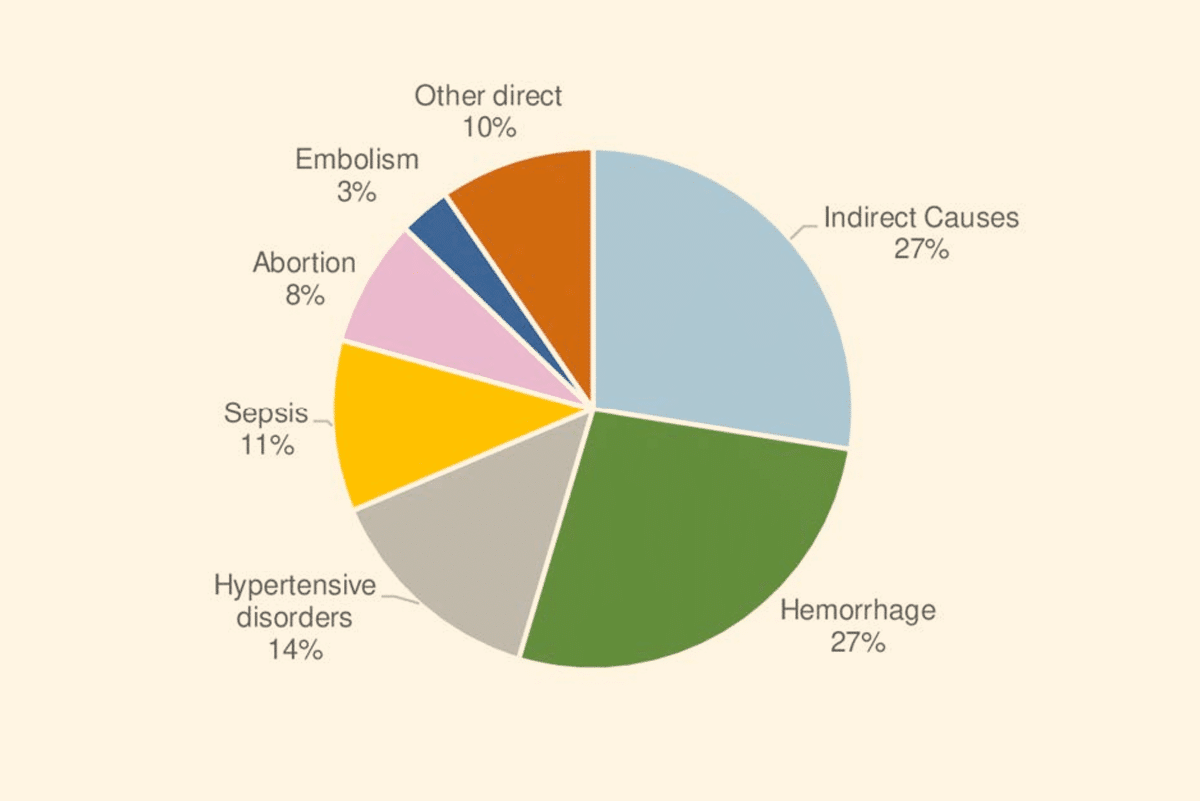
Gynaecologists seek urgent action to combat Nigeria’s alarming maternal mortality rate
Image: Causes of maternal mortality. ResearchGate
Experts in obstetrics and gynaecology have decried Nigeria’s high maternal mortality rate even as they identified some contributing factors causing it and urged the government to demonstrate the political will necessary to address the critical public health issue. They stressed the urgent need for comprehensive strategies and interventions to improve maternal health outcomes and ensure the safety of mothers during childbirth. In separate interviews with the Independent Newspaper, Prof. Nosakhare Enaruna, Head, Department of Obstetrics and Gynaecology, University of Benin Teaching Hospital, and Dr. Sodipo Gbolahan, Medical Director, Igbolgun Medical Centre, raised urgent concerns regarding Nigeria’s alarming maternal mortality rate. Both emphasised that the government must demonstrate the political will to tackle their root causes, particularly the significant contribution of unsafe abortions, which account for approximately 14 percent of maternal deaths.
Prof. Enaruna highlighted that Nigeria currently represents about 20 percent of the global maternal mortality figures, underscoring the severity of the situation. He identified several key healthcare challenges that exacerbate unsafe abortion practices and contribute to both maternal and child mortality rates.
He further explained that the situation is made worse when a woman depends entirely on her partner for critical decisions bordering on care, and financial support, thereby introducing delay and poor access to modern healthcare facilities. He also stated that traditional health workers offer cheap services which served as an attraction to women but noted that the services rendered by these set of health workers constitute a major health challenge. “A lot of women because of poverty patronise traditional health practitioners, however, the methods and applications of the treatments offered in these settings constitute a major health challenge.” He also blamed religious ideology, cultural practices, low contraceptive use, and restrictive abortion laws for the high maternal mortality rate in the country. He also identified the stigma associated with having an unplanned and undesired pregnancy as part of the reasons why the choice of unsafe abortion is attractive to many women. He accused law enforcement agencies of taking advantage of the uncertainties in the country’s restrictive abortion laws to discourage well-trained personnel at standard hospitals from performing safe abortions so that women with unintended pregnancies have very few options.
Both medical practitioners believed that restrictive abortion laws should be repealed because it’s causing emotional disruptions to women and children and cause more economic disruption to women by reducing their productivity and increasing time off work. They called for political will on the part of government.
They also spoke of the need for collaboration between policymakers and healthcare practitioners to liberalise abortion laws in Nigeria, such that qualified health personnel who are willing and able to carry out abortion procedures safely do so without hindrances. Also, there should be designated adolescent and sexual health clinics where specially trained healthcare personnel can attend to the adolescents and the sexual health needs of persons requiring professional care, devoid of stigmatisation.
The issue of the country’s maternal death was the focus of a recent Media Health and Rights Initiative of Nigeria (MHR) training on Sexual Reproductive Health and Rights (SRHR). Held in Lagos, the training brought together journalists who expressed strong concerns regarding the portrayal of abortion in the media, highlighting its significant impact on public perception.
Participants at the training stressed the urgent need for the government to exhibit political will to address this pressing issue. They argued that the current media narrative contributes to widespread ignorance and apathy, which in turn undermines the safety of abortion seekers. The journalists warned that this trend not only suppresses access to safe abortion services but also fosters a dangerous culture of unsafe abortions, leading to tragic outcomes and preventable deaths.
SOURCE: Independent Nigeria, by Chioma Umeha, 25 December 2024
+++
How unsafe abortion causes life-threatening complications for women

This report also says that unsafe abortion is a significant contributor to maternal deaths in Nigeria, but suggests estimates ranging from 20,000 to 50,000 deaths annually, which it says accounts for nearly 40% of maternal deaths in the country. It also says that each year, an estimated 610,000 unsafe abortions are performed in the country, leaving thousands of women at risk of life-threatening complications, including severe bleeding, infections, and organ damage, and that in 2012 alone, approximately 9.22 million women in Nigeria became pregnant, with 14% of those pregnancies ending in induced abortion.
It also calls for strengthening healthcare systems, particularly in rural areas, as critical. The group LIFE advocates for improved availability of family planning services, post-abortion care, and enhanced healthcare infrastructure to ensure that women have access to quality reproductive healthcare.
This article mentions collaborating with other NGOs to make change happen. The article above talks about collaboration between policymakers and doctors. No sources are mentioned for the data in this second article, but the mention of 9.22 million women who became pregnant in 2012 indicates that this author may have been looking at earlier years.
Both articles point to the same multiple causes and recommend the same changes, but this second article also mentions the need for post-abortion care, a crucial means of saving the lives of girls and women who have had unsafe abortions to begin with.
SOURCE: New Telegraph NG, by Tiwo Jimoh, 29 January 2025



